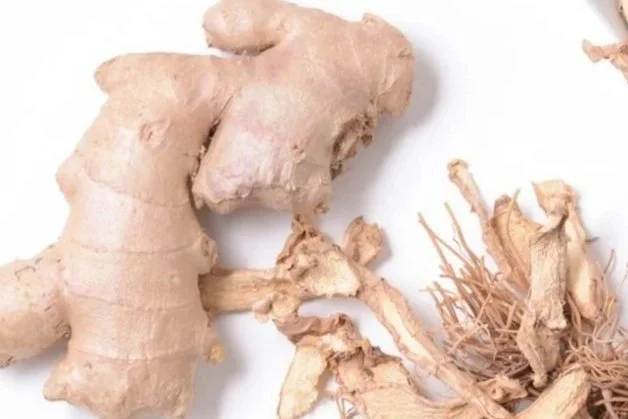Why is Ginger So Good For You?
Ginger, sheng jiang or Zingiberis rhizoma recens is dispersing and slightly warming. It is so commonly used in cooking and herbalism for its ability to relieve nausea and vomiting and disperse phlegm and inflammation for early stage coughs and colds. In Chinese Medicine it enters the Lung, Spleen and Stomach channels. It is considered to have a wide spectrum of use and is often paired with other herbs or used on its own. Common pairings are tangerine peel, green tea, Chinese cinammon twig and jujube dates.
Gan jiang which is the same herb but the older, winter rhizome, while sheng jiang is the summer, more tender and younger rhizome -usually more easily identified by its very think skin. Gan jiang has stronger warming and dispersing properties. It can more strongly unblock channels and warm cold. Those who are sensitive to heat or have heat conditions should avoid this version of ginger as it cause cause heat or excessive dryness. Generally, dried herbs have stronger effects than fresh herbs. Dried ginger that is often included in tea or herbal blends is stronger and should be used in smaller amounts for those who tends towards heat conditions.
A 2020 systemic review and meta-analysis (Morvaridzadeh et. al) showed that ginger had the ability to lower reduce inflammation.
A 2014 systemic review and meta-analysis (Viljoen et. al) showed that ginger reduced nausea symptoms in pregnancy.
Martins et. al in 2019, double blind randomized control trial concluded that ginger could be used in conjunction with NSAID medications to help with acute migraines.
Rayati et. al was able to determine that ginger powder was as effective as ibuprofen in the management of post-surgical pain and inflammation (2017).
Common Chinese Medicine pairings with ginger
Ginger + da zao (jujube) is great for digestion and harmonizing the Spleen and Stomach.
Ginger + Tangerine Peel together dries dampness when there is mucus blocking lungs or dampness that causes nausea and hiccough.
Ginger + gui zhi (Chinese cinnamon twig) expels cold form the muscle layer, warms the channels for early stage cold symptoms accompanied by sensitivity to cold or chills. This combination is also good for those with weak digestion that is exacerbated by cold exposure or cold, damp foods or drink.
Ginger + green tea is good to aid digestion in situations of over eating or eating heavy greasy meals. Additionally they can help with early stage food poisoning or travel diarrhea. Because ginger is warming and green tea is cooling it can be a more balanced combination for those who are sensitive to heat in the body.
Recommended Products
Written by Dr. Emily Siy, DACM on 9/20/25 published on 9/29/25
Use the code ‘BLOG’ for $25 off on an initial acupuncture visit
Sources
Bensky, D., Clavey, S., & Stöger, E. (2004). Chinese herbal medicine: Materia medica (3rd ed.). Eastland Press. pp 33-34, 681-682
Martins, L. B., Rodrigues, A. M. D. S., Rodrigues, D. F., Dos Santos, L. C., Teixeira, A. L., & Ferreira, A. V. M. (2019). Double-blind placebo-controlled randomized clinical trial of ginger (Zingiber officinale Rosc.) addition in migraine acute treatment. Cephalalgia, 39(1), 68–76.
Morvaridzadeh, M., Fazelian, S., Agah, S., Khazdouz, M., Rahimlou, M., Agh, F., Potter, E., Heshmati, S., & Heshmati, J. (2020). Effect of ginger (Zingiber officinale) on inflammatory markers: A systematic review and meta-analysis of randomized controlled trials. Cytokine, 135, 155224
Rayati, F., Hajmanouchehri, F., & Najafi, E. (2017). Comparison of anti-inflammatory and analgesic effects of ginger powder and ibuprofen in postsurgical pain model: A randomized, double-blind, case–control clinical trial. Dental Research Journal, 14(1), 1–7
Viljoen et, E., Visser, J., Koen, N., & Musekiwa, A. (2014). A systematic review and meta-analysis of the effect and safety of ginger in the treatment of pregnancy-associated nausea and vomiting. Nutrition Journal, 13, 20



